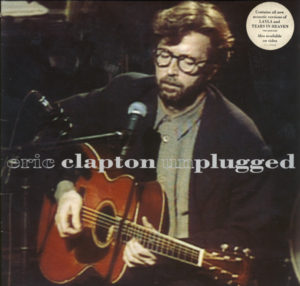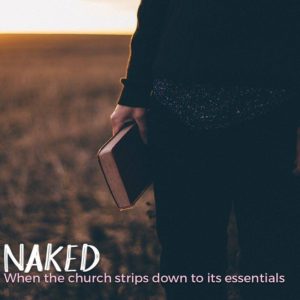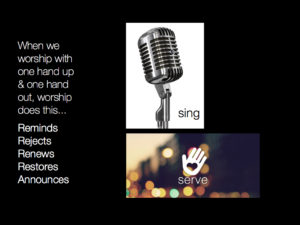 In the early 90’s (ya, ya, I’m dating myself) I really started to get into the music of Eric Clapton. He had been a guitar legend for many years. But in the 90s he came out with a record titled ‘unplugged’. Clapton took a bunch of his songs, stripped them down, and performed them acoustically. Tears in heaven might’ve been my favourite, plus a few other blues tunes he did. This was part of a wider movement of artists who began recording and performing their songs with less tracks, less effects, less noise, and simple arrangements and instrumentation. Some people might say that when we hear a song ‘unplugged’ we get to the heart of the song a little more. It allows the song to breathe.
In the early 90’s (ya, ya, I’m dating myself) I really started to get into the music of Eric Clapton. He had been a guitar legend for many years. But in the 90s he came out with a record titled ‘unplugged’. Clapton took a bunch of his songs, stripped them down, and performed them acoustically. Tears in heaven might’ve been my favourite, plus a few other blues tunes he did. This was part of a wider movement of artists who began recording and performing their songs with less tracks, less effects, less noise, and simple arrangements and instrumentation. Some people might say that when we hear a song ‘unplugged’ we get to the heart of the song a little more. It allows the song to breathe.
Last week we started a series that could’ve easily been called UNPLUGGED. Instead we called it NAKED. A little more edgy, I know, but it really communicates something. We want to strip down to what’s important, to the heart of what the church is, and also what has brought the church to this point in history.
 Last week we talked about The TABLE. The communion table, Eucharist. We were reminded that this table is set before us to remember Jesus sacrifice, but it’s also here to be an example to the world of a better way, a way of unity, and grace, and hospitality. (check out our recap online)
Last week we talked about The TABLE. The communion table, Eucharist. We were reminded that this table is set before us to remember Jesus sacrifice, but it’s also here to be an example to the world of a better way, a way of unity, and grace, and hospitality. (check out our recap online)
This week we talk about another essential, using another image. Well, two images if you will – a microphone and a towel. These two things together help us understand why worship is essential to the church’s past, present and future.
What do I mean when I say worship? Well…it means different things for different people.
- for some it’s tradition
- for some it’s music, singing, and creative production
- for some it’s liturgy
- for some it’s all about the TABLE
- for some it’s not about any of these things, instead it’s only about what they do in the world, every day, to make difference in the things they touch.
Honestly, it’s all these things and more.
Know this…
To worship is human
To give something worth is at the core of how we make decisions
To acknowledge that you value or love something is at the heart of our personalities and humanness
You might say it like this, “You are what you love” “You are what you value” “You are what you worship”
Think about this: If we are what we love and we love what we worship, than we are what we worship! That might change the conversation for you?
Through out biblical history and through out church history, worship has been and continues to be, an essential. Worship happens through song, liturgy, prayers, action, serving, hospitality, and really through everything we do. At its core, worship is what we give value to, what we view as God in our life, who or what we bow to or give our time to or invest our money in.
We get started in the OT with a certain kind of language or narrative.
There is a constant comparison of GOD vs gods. Will you worship Yahweh, the living God or some small ‘g’ god that is as good as dead? The language is plain and simple, black and white at times.
God, Israel’s God, is ALIVE. Other gods are, well, dead. ONE can help, heal, deliver, protect, provide, be present, etc. The ‘others’…they can’t do any of those things.
We get one of our first glimpses into this, in Exodus 20, (part of the 10 commandments) You will have no other God before me. Exodus 34:14 says this, “Do not worship any other god, for the Lord, whose name is Jealous, is a jealous God.” Jealous is a relational term. We see this kind of language in many of the prophets. (Almost like God is telling Israel to be a one man woman)
What we also read from the OT writers is a comparison of a God who made us and god(s) who we made. See the difference? One made us, the others were made by us!
Another prominent theme in the OT is that worship is not just about what you say, or sing or read or pray, but where your heart is found.
“These people come near to me with their mouth
and honor me with their lips,
but their hearts are far from me.
Their worship of me
is based on merely human rules they have been taught. (Isa 29)
Not just lips, but life / Not just words, but heart / Not just acknowledgement, but action
So even early in the biblical narrative, worship is not only important, but it’s bigger and broader than most people understand it to be.
Worship asks us the big question? What do you value, what do you deem worthy of your attention, your feelings, your time, your heart? What or who is it that you love? Because we are what we love – and therefore, we are what we worship. (this is a discussion all on it’s own)
The N.T. story around worship…
As usual, Jesus expands, and brings to completion, what the O.T. started. We’re only going to look at one place, Mark 12. Jesus is asked by Pharisees and Religious teachers, what is the most important of all the commandments (613 of them)? This is how he responds…
(quoting both Deuteronomy & Leviticus)
“The most important one,” answered Jesus, “is this: ‘Hear, O Israel: The Lord our God, the Lord is one. Love the Lord your God with all your heart and with all your soul and with all your mind and with all your strength.’The second is this: ‘Love your neighbour as yourself.’ There is no commandment greater than these.” (29-31)
Have you ever thought about what you’d do if your home as on fire? What would you take, if you could take anything? What would you grab as you escaped?
- children (of course)
- wallet, computer, passport, will (wise)
- your favourite watch (if you have time)
- one guitar…or two…or 3 (I leave one my the entrance in case)
These things are more valuable than furniture, TVs and clothing. Right? By identifying those things, you discover where you priorities lie.
This question Jesus is asked, even though it’s about commandments or laws, is really about worship.
3 things about this text that helps us understand worship a little more…
- Acknowledge God
- Love God
- Love others
Jesus says, essentially, I’m going unplug the loud speakers and the remove the layers. I’m going to strip away the stuff that doesn’t mean as much. Here’s the bottom line. Worship is about recognizing who God is, Loving him, and loving the people he created.
If it ever becomes about more or less than that, we have it wrong.
Jesus teaches us the posture of worship:
ONE hand UP
ONE hand OUT
Worship is never about a place (church building) and position or pizzazz, it’s about posture!
Remember…if we are what we love and we love what we worship, than we are what we worship!
TAKE HOME:
So why do we sing songs then? Together? in gatherings all around the world? Well, there is some biblical evidence and inspiration for that, but let’s look at a cultural reason.
If you’ve watched the movie La La Land, you may have noticed that there is one song that is prominent through out. The movie starts with a broadway-esque version, loud, lots of people, lots of instruments. However, through out the movie, you here many different versions of the same song. Soft, slow, simple, jazz trio, just piano, just melody. Why? The writers are bringing us back to the theme of the movie. The song, repeated, reminds the audience of the main story, intertwined, weaved through, the many scenes of the movie.
That’s why we sing songs on Sunday. They bring us back to the story of Jesus. And give us a vehicle/instrument to worship – to say, God, you’re my God, and I won’t let other ‘g’ods take my attention.
But of course, worship doesn’t only happen in song, but with life and action and everyday stuff. Sing to God & Serve your neighbour. That’s the fulness of what it means to worship!
- Reflects (the story of Jesus)
- Reminds (us of his love and grace)
- Rejects (the ‘g’ods in our world)
- Renews (our hearts and minds)
- Restores (our brokenness)
- Announces (the gospel story, the biblical narrative that leads us to Jesus, who said, to Love God fully, and Love our neighbour as we love ourself)

